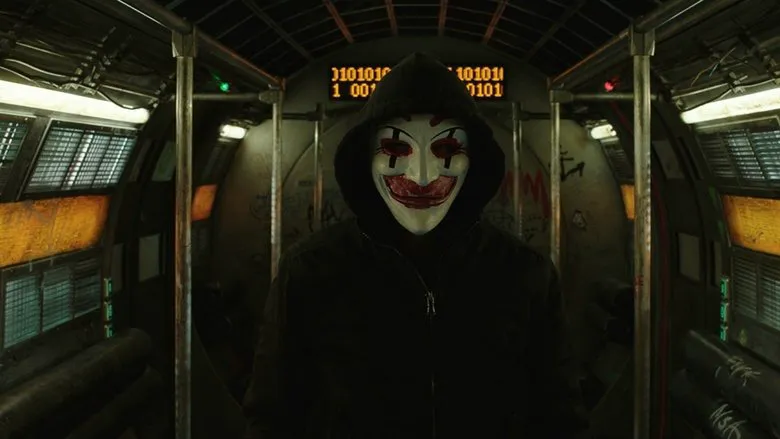Who Am I: A Thrilling Hacker Heist with a “Fight Club” Twist
This film is a surprisingly successful reimagining of the split-personality trope, reminiscent of “Fight Club,” with several captivating twists along the way. It’s a vibrant, youthful film that’s both daring and engaging.
Benjamin, the protagonist, is the epitome of invisibility in Berlin. Overlooked in school and disregarded in adulthood, he’s practically a ghost. However, when he steps into the digital realm, Benjamin transforms into “WhoAmI,” a hacking virtuoso. Inspired by the enigmatic hacker Mr. X, Benjamin joins a group of hackers led by the charismatic Max. Together, the quartet becomes an unstoppable force, quickly attracting the attention of both the police and rival hackers. But Benjamin, a master strategist, always plans several steps ahead, guiding his team toward victory even when capture seems imminent.

Following its premiere at the Toronto International Film Festival, Warner Bros. acquired the rights to create an English-language remake of “Who Am I.”
Unlike French cinema, German films don’t often grace Russian screens. We see festival darlings and Til Schweiger comedies, but rarely do we get a glimpse into the movies that resonate with young German audiences. “Who Am I” is not just a film; it’s a German box-office champion – a dynamic, emotional movie aimed at a tech-savvy audience familiar with the internet and social media. In other words, it’s perfect for the same moviegoers who frequent Russian cinemas. So, let’s explore what makes this film so appealing to German audiences.

The film’s producers, Quirin Berg and Max Wiedemann, are the founders of the renowned German company Wiedemann & Berg. Their first theatrical release, “The Lives of Others,” won an Academy Award.
Hacking the System, One Click at a Time
What appeals to German viewers is the film’s exploration of online vulnerability. While hacker movies are a dime a dozen, “Who Am I” strikes a delicate balance between portraying super-hackers who can crack the Pentagon with a few keystrokes and depicting petty thieves who steal social media accounts. The Clay cybergroup, which Benjamin joins, engages in flashy but largely harmless crimes against the system, not individuals. They might infiltrate a neo-Nazi conference to sabotage their promotional video, manipulate stock market data on German exchange servers to create amusing graphs, or make the windows of a pharmaceutical company scream about animal testing. As the saying goes, “What’s the crime?” But that’s only true for so long.

From Pranks to Peril: The “Fight Club” Connection
The characters’ activities eventually escalate beyond mere pranks and boasting, leading to real cybercrimes with victims. The invisible heroes transform into a destructive force. At this point, “Who Am I” begins to morph into David Fincher’s “Fight Club.” Director Baran bo Odar doesn’t even try to hide the influence – a “Fight Club” poster hangs in the protagonist’s room, and one scene mirrors the iconic opening credits of Fincher’s film. But this isn’t a cheap imitation; it’s intriguing. And, surprisingly, it’s just the tip of the iceberg. The film culminates in an exploration of fictional identities, similar to Tyler Durden, but with an original twist and an open ending.

Is It Worth Watching?
Does the successful paraphrase of “Fight Club” make “Who Am I” a good film? It certainly adds to its appeal – at the very least, it makes you want to rewatch it to see if the protagonist is truly interacting with his inner demons. However, “Who Am I” doesn’t quite reach the genius of “Fight Club.” It’s less concise, a bit too long, and often takes unnecessary plot detours and digressions. The filmmakers deserve praise for their original depiction of virtual space, but they also deserve a scolding for the sluggish subplot involving Inspector Lindberg. The film sometimes stumbles, but it finds its focus in the final act – even if some viewers might have drifted off or left the theater by then.
However, those who stick around won’t be disappointed. Initially, it’s hard to see what Germans found so special about this film. It’s interesting, but no more so than hundreds of similar Hollywood movies. But the ending is truly captivating, and the final cliffhangers still work. While “Who Am I” doesn’t have Brad Pitt, skyscrapers collapsing to the sound of the Pixies, or a cult novel as its source material, this kind of reimagining of a familiar plot can be beneficial. Fortune favors the bold, and Baran bo Odar took a risk that paid off. Tyler Durden would approve and tell others, disregarding the first rule of the club.